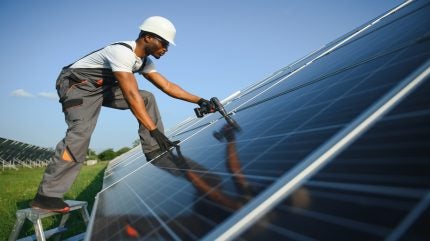
Solar panel imports into Africa have surged by 60% in the year to June 2025, according to an analysis by energy think tank Ember.
The imports of solar panels into Africa have reached a total of 15,032MW in the 12 months to June 2025, up from 9,379MW in the previous year.

Discover B2B Marketing That Performs
Combine business intelligence and editorial excellence to reach engaged professionals across 36 leading media platforms.
This growth is spread across the continent, with 20 countries hitting new highs in solar panel imports.
South Africa continued to be the largest solar importer in the 12 months to June 2025.
Nigeria has become the second-largest importer of solar panels, with 1,721MW brought in over the past year, surpassing Egypt and followed by Algeria with 1,199MW.
Notably, several countries have seen exponential growth in imports, with Algeria’s imports increasing 33-fold and Zambia’s by eight times.

US Tariffs are shifting - will you react or anticipate?
Don’t let policy changes catch you off guard. Stay proactive with real-time data and expert analysis.
By GlobalDataEmber chief analyst Dave Jones said: “The take-off of solar in Africa is a pivotal moment. This report is a call to action, urging stronger research, analysis and reporting on solar’s rise – to ensure the world’s cheapest electricity source, fulfils its vast potential to transform the African continent.”
Despite the record imports, it remains unclear how many solar panels have been installed.
However, the potential impact on electricity generation is substantial. For instance, Sierra Leone’s recent imports could account for 61% of its 2023 electricity generation if fully installed while Chad could see a 49% contribution.
The report also highlights the economic benefits of solar panel imports, suggesting that the savings from reduced diesel usage could cover the cost of solar panels within six months in Nigeria.
In nine of the top ten importing countries, the value of refined petroleum imports far exceeds that of solar panels, by a factor of 30 to 107.
There is a pressing need for more data and research to fully understand and harness the potential of the solar surge in Africa.
While the continent is not yet experiencing a solar boom on the scale of Pakistan’s recent expansion, the initial signs of change are evident, and further evidence could unlock opportunities for the power sector.



